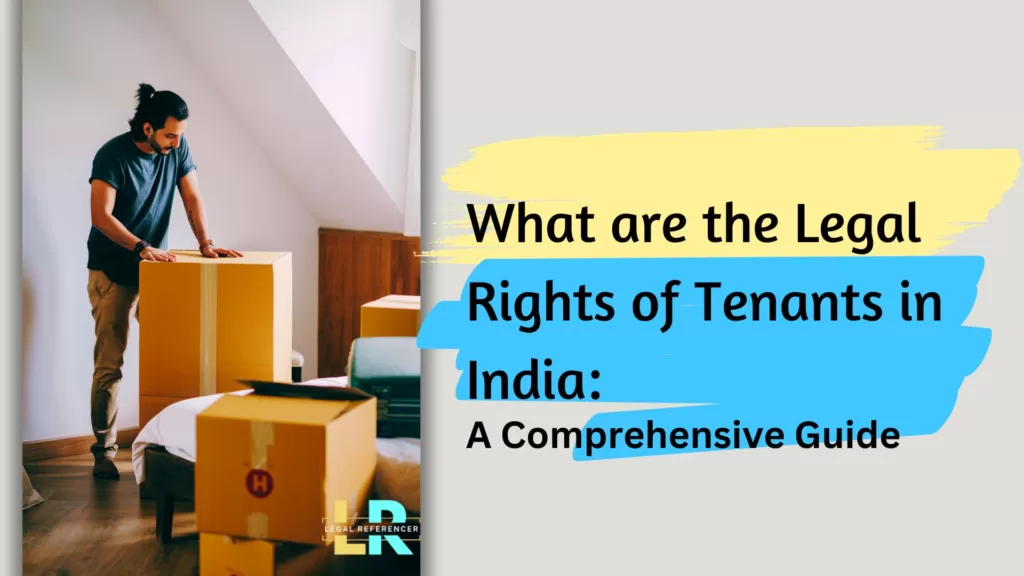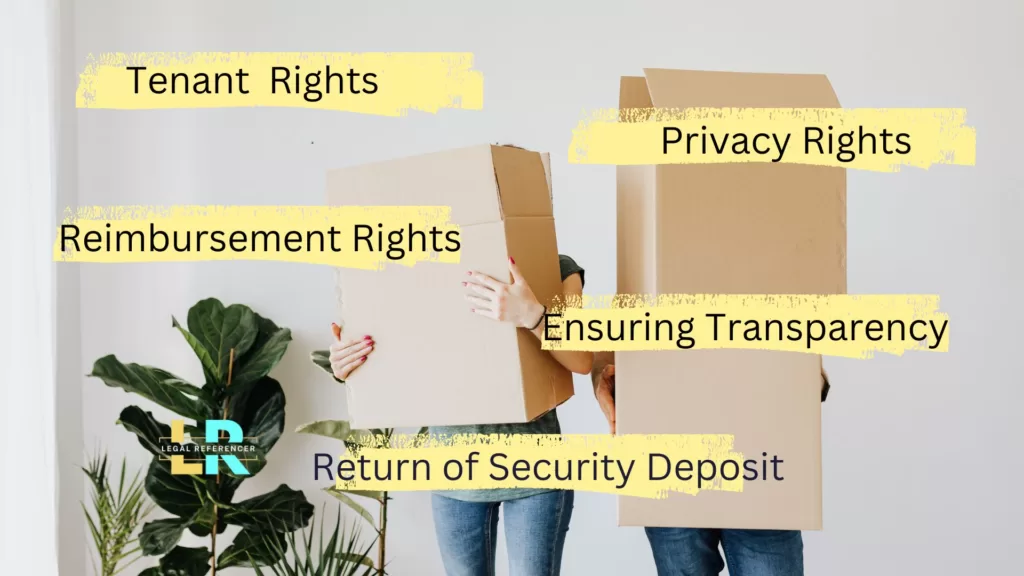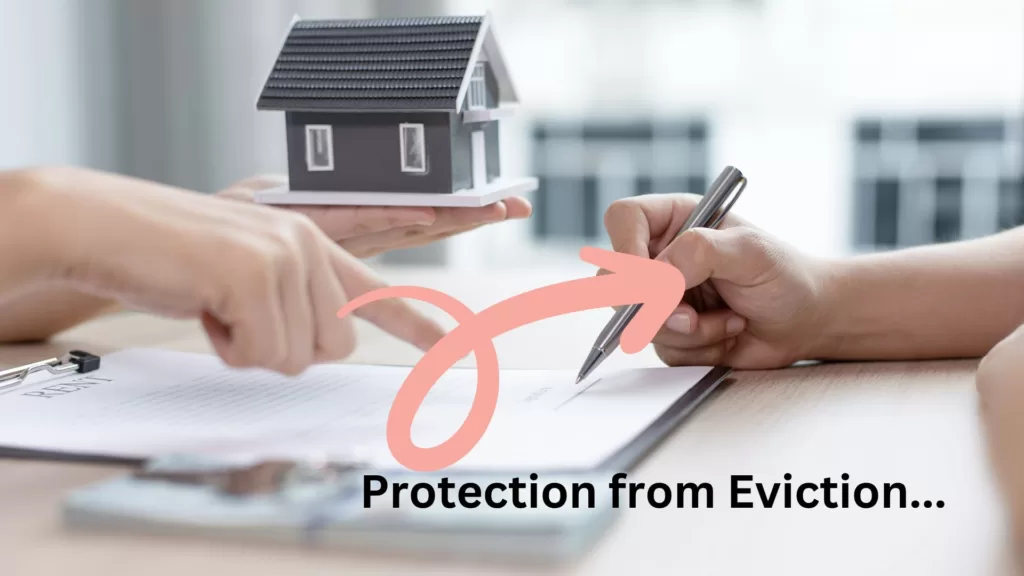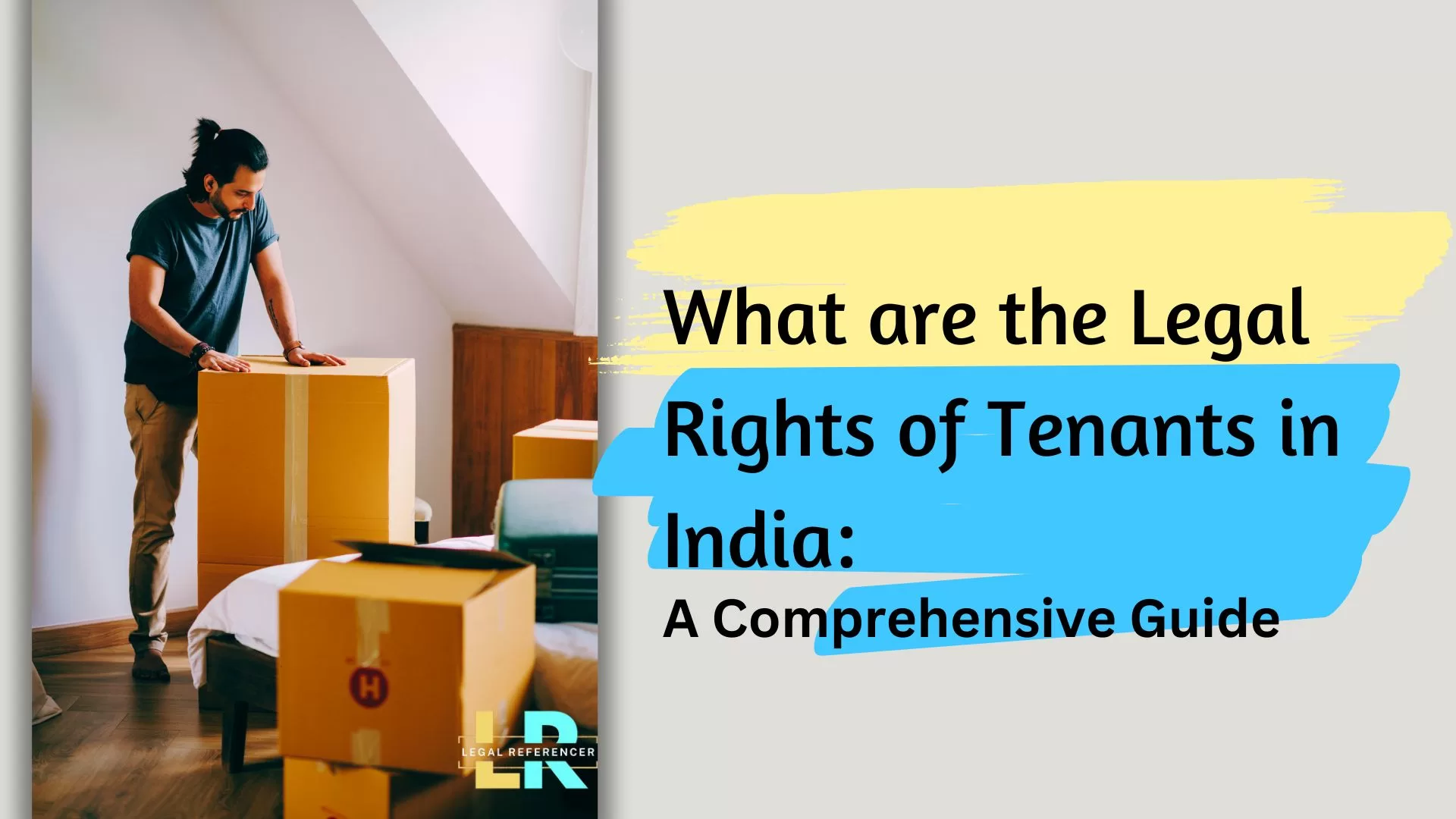Introduction:
Being a tenant in India entails a vital need to acquaint oneself with your legal rights, ensuring a secure and harmonious rapport with your landlord. This awareness of your rights serves as an empowerment to safeguard your interests and effectively resolve potential disputes that might surface. This article presents a comprehensive manual on the legal privileges of tenants in India, encompassing pivotal facets of the tenant-landlord dynamic and the pertinent legislative framework. Within the Indian context, a tenant denotes an individual or entity that engages in the renting or occupancy of a property, typically spanning residential or commercial domains, from a landlord.
The occupant establishes a contractual arrangement, referred to as a tenancy agreement or lease, with the property owner to acquire the privilege of utilizing and residing in the leased space. The occupant holds the responsibility of adhering to the agreed-upon terms for rent payment and is also vested with specific entitlements and safeguards as per the relevant tenancy statutes. The description “occupant” encompasses individuals, households, enterprises, associations, and any other entities engaged in property rental, whether for residential or commercial intentions.

Following are some legal and important rights of tenants
1. Fair Rent: Ensuring Reasonable Rental Charges
When leasing a property, regulations prevent property owners from enforcing excessively high rental charges. It remains crucial to assess the property’s value prior to setting the rental fee.”If a tenant feels that the rent demanded is unjustifiably high compared to the property’s worth, they have the right to challenge it in court. Typically, rent is calculated at approximately 8 to 10% of the property’s value, taking into account construction costs and any fixtures present.
In cases where a property owner declines rent payments or omits issuing receipts, the tenant should ensure consistent payments over a two-month period using a postal money order or an alternative method outlined by pertinent rules. If, despite this duration, the landlord persists in refusing rent and additional fees, the tenant retains the choice to place the funds in custody of the Rental Authority in accordance with the relevant regulations.
2. Rent Agreement:
A legally binding rent agreement serves as the foundation for a tenancy.It ought to encompass particulars like the span of the lease, the rental sum, payment methodology, and the mutually agreed-upon stipulations and conditions. Ensure that the agreement is registered with the appropriate authority if the tenancy period exceeds 11 months.
3. Privacy Rights: Safeguarding Tenant’s Personal Space
Every tenant holds the fundamental right to privacy within their rented dwelling. The landlord can only enter the premises after obtaining prior permission or providing appropriate notice, except in genuine emergency situations like a bathroom fire or flooding.
Furthermore, should the landlord engage in harassment tactics such as unwarranted eviction endeavors or unwarranted refusal of rent acceptance, the tenant possesses the right to serve a written notice. The tenant retains the prerogative to solicit the landlord’s bank account particulars to facilitate direct rent deposition. In the event of persistent landlord non-responsiveness, the tenant maintains the alternative to remit the rent via a money order. If the inaugural endeavor proves fruitless, the tenant retains the ability to seek aid from a Rent Control Court in order to facilitate the forthcoming rent payment deposition process.
4. Reimbursement Rights: Shared Responsibility for Maintenance
Apart from the usual wear and tear, both the landlord and tenant hold individual responsibilities for maintaining the rented premises, regardless of any written agreement stating otherwise. However, it is the landlord’s duty to handle property repairs and ensure that the premises are kept in good condition.The precise responsibilities of both the tenant and the landlord concerning the upkeep and mending of communal amenities used by both parties will be ascertained based on the terms set forth in the lease accord.
5. Security Deposit:
A landlord is entitled to collect a security deposit from the tenant, usually equal to a few months’ rent. The return of this deposit ought to be made to the tenant at the conclusion of the lease term, with the exception of deductions necessary for damages surpassing ordinary usage. As part of the rental arrangement process, occupants are generally obligated to furnish a security deposit. This deposit acts as a monetary buffer for the landlord, addressing unpaid rent, pending invoices, or damages that go beyond reasonable wear and tear upon the lease term’s culmination Generally, the security deposit amount equals one month’s rent.
6. Landlord’s Information Disclosure: Ensuring Transparency
In scenarios where a property owner enlists the assistance of a property manager, it becomes crucial for the landlord to furnish the tenant with the ensuing details:
- The identity of the property owner.
- Documentation substantiating the landlord’s authorization of the property manager’s role.
- The precise objectives for which the landlord has sanctioned the property manager’s responsibilities, accompanied by the duration of this authorization.
- If the property manager operates as a legal entity, the appellation of said entity and the individual duly authorized to act in that capacity.
It is expressly forbidden for either the property manager or the landlord, acting individually or indirectly through intermediaries, to withhold essential amenities or provisions from the tenant’s leased premises.
Sustaining transparency and the timely sharing of information is pivotal in cultivating an equitable and seamless rapport between the landlord and tenant.
7. Uninterrupted Living: Preserving Tenant’s Peaceful Stay
Should an unforeseen situation arise that renders the leased property untenable or inhibits the tenant’s habitation, the landlord possesses the right to resume rent collection once the premises have been reinstated to a habitable state, in accordance with the conditions delineated within this section. Nonetheless, if the landlord neglects to effect the necessary repairs despite receiving written correspondence from the tenant and the property’s inhabitable status persists, the tenant retains the entitlement to deliver a written notice spanning fifteen days to the landlord, thereby signaling their intent to vacate the premises.

8. Rent Increase:
During the tenancy, landlords can increase the rent only after providing a reasonable notice period, as specified in the rent agreement. The rent cannot be increased arbitrarily or excessively.
9. Protection from Eviction: Safeguarding Tenant’s Rights
In alignment with the Model Act’s guidelines, a tenant cannot be subjected to eviction by the landlord while the tenancy agreement remains in force, unless any of the subsequent conditions have been met:
- The tenant deliberately refrains from paying rent.
- The tenant defaults on rent or owed charges.
- The tenant inflicts damage on the property or undertakes structural alterations without obtaining prior approval from the landlord.
- There arises a necessity to temporarily displace the tenant for the landlord to execute essential property repairs, either on the entirety of the property or a segment thereof.
- When the tenant officially communicates their intention to vacate the premises to the landlord, and subsequently, the landlord agrees to proceed with the property’s sale.
- In the regrettable circumstance of the landlord’s passing, should a legitimate necessity arise for the property to be leased by the rightful heirs, they retain the authority to initiate a petition with the Rent Court, pursuing eviction and reclaiming possession.
These provisions are designed to safeguard the tenant’s entitlement to a secure tenancy and avert unjustified evictions, thereby establishing a realm of equity and impartiality within the rental journey.
10. Maintenance and Repairs:
The landlord is responsible for ensuring that the rented property is well-maintained and habitable. It is their duty to carry out necessary repairs promptly, especially those affecting the tenant’s safety and convenience. However, minor repairs may be the tenant’s responsibility as per the rent agreement.
11. Instances where the Tenant Can Assert Their Rights by Declining the Landlord
Tenants have certain rights that empower them to lawfully decline the landlord in case of the following breaches:
Oral Agreement: If the landlord violates the terms agreed upon orally between the parties.
Improper Notice: When the landlord fails to provide proper notice regarding important matters such as rent increase, eviction, or entry into the premises.
Illegal Liabilities: If the landlord attempts to impose unlawful responsibilities or burdens on the tenant.
Last Month Settlement: When the landlord disregards the tenant’s right to settle any outstanding dues or obligations during the last month of the tenancy.
Deposit Return: If the landlord unjustly withholds or refuses to return the tenant’s security deposit upon the termination of the tenancy.
In the Case of a Deceased Tenant: When the landlord fails to acknowledge the rights and procedures concerning the tenancy in the event of the tenant’s death.
Rent Increase: If the landlord raises the rent amount arbitrarily or excessively, without adhering to the applicable legal provisions.
Forced Extension: When the landlord compels the tenant to extend the tenancy against their will or without proper legal grounds.
These situations empower tenants to assert their rights and decline the landlord’s demands or actions that breach the established terms and protections.
12. Eviction and Notice Period:
A landlord’s ability to evict a tenant hinges on adhering to the established legal protocol. The procedures for eviction are outlined in the relevant laws, such as the Rent Control Act or state-specific variations. Generally, a landlord is required to furnish a notice period spanning from 30 to 180 days, contingent on the circumstances and the specific laws of the state. Here’s further elucidation on the process of eviction and the related notice period:
Grounds for Eviction:
The landlord can initiate eviction proceedings only on valid grounds sanctioned by either the Rent Control Act or state-specific renditions. These grounds encompass instances like rent non-payment, contractual breaches, unlawful activities on the premises, or other reasons stipulated by the pertinent laws.
Proper Legal Process:
For a tenant’s eviction, the landlord must adhere to the legally established process elucidated within the applicable laws. This typically involves issuing a written notice to the tenant, delineating the reasons for eviction and the stipulated notice duration.
Notice Period Variation:
The requisite notice period for eviction may differ based on specific circumstances and the statutes of the state. It is imperative for both landlords and tenants to be cognizant of the precise notice period relevant to their respective jurisdictions. The notice duration can range from 30 days to 180 days, granting the tenant ample time to secure alternative housing.
Tenant’s Right to Contest:
Tenants are entitled to contest an eviction notice if they perceive it as unjust or if they possess valid defenses against the grounds asserted by the landlord. They can present their case before the appropriate tribunal or court, which will impartially assess the validity of the eviction.
Legal Assistance:
In intricate eviction scenarios or when tenants require clarification regarding their rights, enlisting the expertise of an attorney specializing in tenancy laws can be advantageous. A legal expert can offer valuable counsel, navigate the legal procedure, and ensure the protection of the tenant’s rights.
Retaliatory Eviction:
It is important to note that retaliatory eviction, where a landlord attempts to evict a tenant in response to the tenant exercising their legal rights, is prohibited by law. Tenants should be aware of this protection and take necessary action if they believe they are being subjected to retaliatory eviction.
Documentation and Communication:
Both landlords and tenants should uphold meticulous records of all communication, including notices, rent receipts, and any disputes or grievances. This documented record can serve as substantiation in the event of legal proceedings associated with eviction or tenancy conflicts.
Comprehending the eviction process and having an awareness of their rights empowers tenants to shield themselves from undue eviction endeavors, guaranteeing an equitable and lawful resolution for any tenancy-related matters that may emerge.

13. Essential Services:
Obligation to Provide Essential Services:
Legally, landlords bear the responsibility of ensuring that tenants enjoy access to indispensable utilities like water, electricity, and other facilities essential for the fundamental needs and livability of the leased property. This obligation remains regardless of whether the tenant has met their rental obligations.
Unlawful Withdrawal of Services:
Landlords are prohibited from withholding or discontinuing essential services as a coercive tactic to extract rent payment or retaliate against tenants for any reason. Such denial of vital services is regarded as an unjust and illicit action, affording tenants the right to pursue legal measures to address such instances.
Legal Remedies for Tenants:
When a landlord wrongfully denies essential services, tenants possess the right to pursue legal action. They have the option to lodge a complaint with the relevant authorities or seek resolution through forums like the Rent Court or other applicable legal avenues within their jurisdiction. Maintaining records of service disruptions and any communication with the landlord can serve as significant evidence to bolster the tenant’s case.
Role of Rent Control Acts:
Rent Control Acts or region-specific tenancy regulations often encompass clauses designed to safeguard tenants’ entitlement to essential services. These statutes delineate landlords’ responsibilities and offer remedies for tenants in cases of service interruptions or other violations. It’s important for tenants to acquaint themselves with the pertinent laws applicable to their state or locale.
Mediation and Dispute Resolution:
In scenarios where disputes arise over the provision of essential services, both tenants and landlords have the option to explore mediation or alternative methods of resolving conflicts. Mediation can facilitate the identification of mutually acceptable solutions, sidestepping prolonged legal proceedings.
Maintenance and Repairs:
Landlords bear the onus of upkeeping the infrastructure and systems integral to rendering essential services. Should issues concerning water supply, electricity, or other indispensable amenities arise due to equipment malfunction or structural deficiencies, landlords must promptly address these maintenance or repair requirements.
Assuring access to essential services stands as a cornerstone for tenants to enjoy a habitable living space. It’s crucial for tenants to be well-informed about their rights and to respond appropriately should they encounter disruptions or withholding of essential services by their landlords
14. Tenant Harassment and Retaliation:
The engagement in harassment towards tenants by landlords, which encompasses actions like terminating essential services or effecting coercive evictions, is deemed unlawful. Likewise, resorting to retaliatory measures against tenants who exercise their legitimate rights, such as submitting complaints or seeking necessary repairs, is unambiguously forbidden.
Prohibited Actions:
It is legally impermissible for landlords to partake in harassment or retaliation directed at tenants. Harassment encompasses acts like cutting off essential services (e.g., water, electricity), enforcing eviction without due process, or creating an atmosphere of intimidation or hostility. Retaliation pertains to negative actions taken by landlords as a reaction to tenants exercising their lawful rights, including reporting issues or requesting maintenance.
Legal Protection:
Tenants are shielded by legal provisions designed to shield them from harassment and retaliation. These laws are designed to guarantee equitable treatment, respect, and a secure living environment. Landlords found culpable of harassment or retaliation could face legal ramifications, including financial penalties and other sanctions.
Reporting and Documentation:
In the event that tenants encounter landlord-driven harassment or retaliation, it’s crucial to document the incidents meticulously, recording dates, times, descriptions, and any available evidence, such as photos or statements from witnesses. This documentation serves as pivotal proof in legal proceedings or when registering complaints with the relevant authorities.
Filing Complaints:
Tenants possess the entitlement to lodge complaints with pertinent housing authorities or regulatory bodies responsible for addressing landlord-tenant conflicts. These entities hold the capacity to examine the allegations and implement suitable measures against the landlord if the assertions are verified.
Legal Remedies:
When faced with harassment or retaliation, tenants have the option to pursue legal remedies via civil court proceedings. Potential recourse might encompass seeking compensation for damages endured, securing injunctions against further harassment or retaliation, or even exiting the tenancy agreement sans penalties.
Consultation with Legal Professionals:
For tenants grappling with harassment or retaliation, it’s advisable to seek counsel from legal professionals well-versed in landlord-tenant legislation. These experts can offer insights into the specific legal avenues available and aid in safeguarding the tenant’s rights.

15. Subletting:
In most cases, tenants require the landlord’s written consent before subletting the premises or transferring the tenancy to someone else. Subletting without permission can lead to eviction.
16. Dispute Resolution:
In situations where conflicts arise between tenants and landlords, the pathways for resolution encompass negotiation, mediation, or legal recourse. Maintaining comprehensive records of communication, rent receipts, and agreements is advised to substantiate claims when necessary.
Beyond national legislation, individual states within India may have distinct tenancy laws and regulations. Familiarizing oneself with the specific laws applicable to their state is essential, as variations might exist in rent control, eviction protocols, and related aspects.
Arbitration stands as a dispute resolution method involving an impartial third party, often called an arbitrator, appointed to evaluate the presented arguments and evidence from both tenants and landlords. The arbitrator’s determination, known as an arbitration award, holds legal binding force on both parties.
Voluntary Agreement: Arbitration typically requires the consent of both tenant and landlord, signifying an agreement to opt for arbitration instead of court proceedings. Parties may incorporate an arbitration clause within their rental agreement, stipulating that any disputes will be resolved through arbitration.
Neutral Third Party: The arbitrator serves as an unbiased third party, selected through mutual agreement or by a designated arbitration entity. It’s essential for the arbitrator to possess experience and proficiency in tenancy laws and dispute resolution strategies.
Informal Procedure: Arbitration offers a less rigid and more adaptable process compared to formal court proceedings. It grants both sides the opportunity to present their case, introduce evidence, and make arguments in a less adversarial context.
Arbitration Hearing: The arbitration hearing is scheduled at a mutually convenient time and place. Both sides present their evidence, including documents, witnesses, and testimonies, to bolster their respective stances. The arbitrator evaluates the evidence and attentively listens to the arguments put forth by both parties.
Binding Decision: After careful consideration of the evidence and arguments, the arbitrator delivers a decision termed as an arbitration award. This decision stands as definitive and binding on both tenant and landlord, necessitating compliance with its terms.
Enforcement of Arbitration Award: Should either party fail to adhere to the arbitration award, the opposing party can seek enforcement through appropriate legal avenues. In numerous jurisdictions, arbitration awards can be enforced in a manner akin to court judgments.
Advantages of Arbitration: Arbitration offers several advantages, including expedited resolution compared to court proceedings, reduced costs, privacy, and the capacity to select an arbitrator specialized in tenancy matters. Additionally, it fosters a less formal and more cooperative environment for dispute resolution.
Limitations: It’s crucial to recognize that arbitration might not be suitable for all types of disputes, especially those involving intricate legal intricacies or cases necessitating extensive investigation and formal legal procedures. Furthermore, arbitration clauses within rental agreements should be meticulously reviewed and comprehended by both parties to ensure equity and to prevent potential drawbacks.
Arbitration emerges as a viable alternative to court litigation for settling tenant-landlord disputes. It presents an efficient, binding, and streamlined process that facilitates just and effective conflict resolution.

17. Acts and Laws that govern the rights and obligations of tenants and landlords
In India, there exist multiple laws and acts that govern the responsibilities and entitlements of tenants and landlords. Several significant legislations concerning the tenant-landlord dynamic encompass:
The Rent Control Act:
The Rent Control Act constitutes state-specific legislation designed to oversee rental matters encompassing rent regulation, eviction procedures, and other relevant aspects of tenancy. Each Indian state possesses its distinct Rent Control Act, which outlines the obligations and rights of both tenants and landlords, details the eviction process, incorporates rent control measures, and establishes mechanisms for resolving disputes.
The Transfer of Property Act, 1882:
The Real Estate (Regulation and Development) Act, 2016:
Enacted to regulate the real estate realm, including rental housing, the Real Estate Act of 2016 delineates guidelines for rental agreements. It promotes transparency within rental transactions and institutes a dispute resolution mechanism.
The Consumer Protection Act, 2019:
The Consumer Protection Act of 2019 safeguards consumer rights, a category which includes tenants. Its framework upholds equitable practices, addresses grievances, and facilitates the resolution of consumer-related conflicts, encompassing matters related to leased properties.
State-Specific Tenancy Laws:
In addition to the above-mentioned statutes, certain states have implemented their particular tenancy laws. As an example, Maharashtra operates under the Maharashtra Rent Control Act, 1999, while Delhi adheres to the Delhi Rent Control Act, 1958. These state-specific legislations may include supplementary provisions and regulations regarding tenancy, eviction protocols, and rent control.
Conclusion:
Being well-versed in your legal rights as a tenant in India is pivotal to ensure an unhindered and stress-free tenancy. This article has furnished an all-encompassing survey of the central rights and dimensions of the tenant-landlord rapport. It’s advisable to acquaint yourself with the precise laws of your state and to consult legal experts if further clarity or guidance is needed. By grasping and exercising your rights, you can guarantee an equitable and secure rental experience..
Also Read; CREDIT CARD LEGAL NOTICE- HOW TO REPLY? WHAT TO DO? IS IT SERIOUS? 9 STEPS TO FOLLOW
Frequently asked questions [FAQs]
Q1. What is a rent agreement, and why is it important?
A rent agreement constitutes legally enforceable document that delineates the terms and conditions governing the landlord-tenant relationship. Within its framework, it precisely delineates aspects including the rental sum, tenancy duration, payment method, and other mutually accepted provisions. Its significance lies in its role as a point of reference and its capacity to confer legal safeguards to both parties in the event of disagreements.
Q2. Can a landlord increase the rent arbitrarily?
No, a landlord is not at liberty to capriciously escalate the rent amount. Any instances of rent augmentation must be explicitly documented within the rental agreement or accomplished through the mutual consensus of both parties. The stipulated rent increase should be rational and maintain alignment with the terms laid out in the agreement.
Q3. What are the tenant’s rights regarding repairs and maintenance?
The landlord is responsible for maintaining the rented property in a habitable condition. They should carry out necessary repairs promptly, especially those that affect the tenant’s safety and convenience. However, minor repairs may be the tenant’s responsibility as per the terms of the rent agreement.
Q4. Can a landlord enter the rented property without the tenant’s permission?
No, a landlord is not authorized to enter the rented property without obtaining the tenant’s explicit permission. Exceptions exist in situations of emergencies or when essential maintenance or repairs are required. The tenant is entitled to privacy within the confines of the rented premises.
Q5. What is the notice period for eviction?
The notice period for eviction varies contingent upon specific circumstances and the governing legal provisions. Typically, this notice span ranges anywhere from 30 to 180 days. The precise notice period is ascertained by either the Rent Control Act or the state-specific Rent Control Act in effect.The notice period for eviction varies depending on the circumstances and the applicable laws.
Q6. Is harassment by the landlord illegal?
Yes, harassment by the landlord is illegal. Cutting off essential services, forcefully evicting the tenant, or engaging in any retaliatory actions against the tenant exercising their rights are strictly prohibited.
Q7. Can a tenant sublet the rented premises?
In most cases, tenants require the written consent of the landlord before subletting the premises or transferring the tenancy to someone else. Subletting without permission can lead to eviction.
Q8. How can disputes between tenants and landlords be resolved?
Resolving disputes encompasses options like negotiation, mediation, or resorting to legal channels. It’s recommended to uphold proper documentation of all correspondence, rent receipts, and agreements to substantiate your stance if the need arises. In intricate cases, seeking legal counsel can offer valuable assistance in dispute resolution.
Q9. Are there state-specific laws for tenants in India?
Yes, beyond nationwide legislation, individual states within India might implement their distinct tenancy laws and regulations. It’s essential for tenants to acquaint themselves with the particular laws pertinent to their state, given that these regulations may diverge concerning aspects such as rent control, eviction protocols, and related matters.
Q10. What should tenants do if they face a violation of their rights?
In cases where tenants confront breach of their rights, it’s advisable for them to compile evidence such as photographs, documents, and records of communication to substantiate their case. Subsequently, they can approach legal authorities or seek guidance from a legal professional to undertake suitable measures against the landlord.

